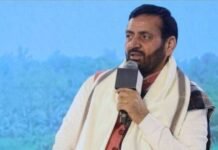
Ladakh’s prominent statehood activist and Ramon Magsaysay Award winner Sonam Wangchuk has been arrested just a day after declaring that he would be “happy to be arrested anytime for this cause.” His detention follows allegations that he incited a mob through provocative remarks, a charge he has firmly denied. The arrest has intensified tensions in the Union Territory, which is already grappling with unrest after recent clashes claimed four lives and left more than 50 people, including security personnel, injured.
The move against Wangchuk also coincides with the Ministry of Home Affairs’ decision to cancel the registration of his well-known non-profit, Students Educational and Cultural Movement of Ladakh (SECMOL), under the Foreign Contribution (Regulation) Act, 2010. The cancellation bars the organisation from receiving funds from abroad, a significant setback for the educational and cultural initiatives SECMOL has been spearheading in the Himalayan region for decades.
Wangchuk, who has gained international recognition for his sustainable development work and his advocacy for Ladakh’s unique cultural and ecological identity, has been at the forefront of the demand for statehood and constitutional safeguards under the Sixth Schedule. His arrest has sparked widespread debate, with critics calling it an attempt to silence dissent and curtail democratic rights in a region that has seen growing discontent since the abrogation of Article 370 and the bifurcation of Jammu and Kashmir in 2019.
The violence earlier this week exposed the deepening frustrations of locals who feel increasingly alienated from decision-making processes that directly impact their livelihoods, environment, and future. The Union Territory administration and the Centre, however, have accused Wangchuk of playing a role in fanning these tensions by delivering statements that allegedly incited the crowd.
Wangchuk has categorically rejected these claims, maintaining that his campaign has always been peaceful and rooted in Gandhian ideals of non-violence. “I have only spoken for the rights of Ladakhis and the protection of our fragile environment. If that is a crime, I am ready to face arrest,” he had remarked before being taken into custody.
His arrest and the crackdown on SECMOL mark a turning point in Ladakh’s political and civil society landscape. Many believe it signals a hardening stance by the government against those pushing for constitutional safeguards and greater autonomy. For the people of Ladakh, who once celebrated Wangchuk as a voice of innovation and integrity, his detention is not just about one activist—it is seen as symbolic of the shrinking democratic space in the Union Territory.
As the dust settles over the recent violence, the spotlight now shifts to how the government handles both the security challenges and the political aspirations of Ladakh’s people. For now, Sonam Wangchuk’s arrest has only added fuel to a simmering movement that shows no signs of quieting down.
This is a web generated news report





